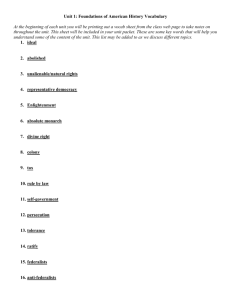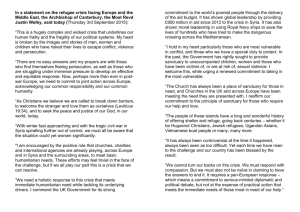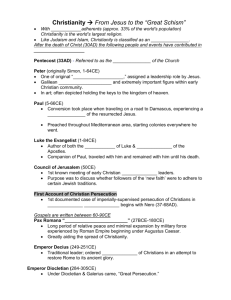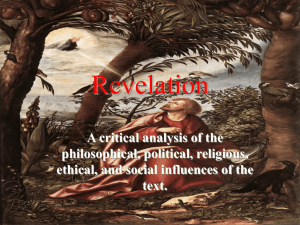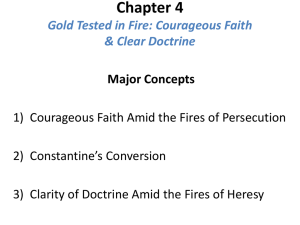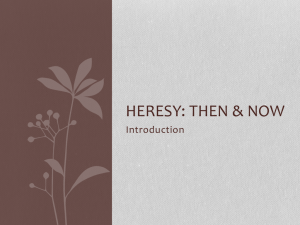The Great Persecution
advertisement
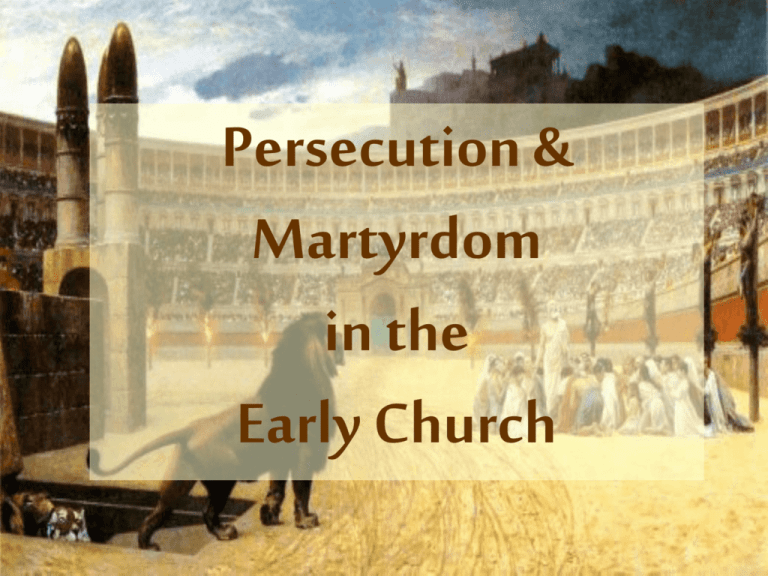
Persecution & Martyrdom in the Early Church Persecution in the First-Century Church I. Persecution in the New Testament Jesus warned his disciples of coming persecution: John 15:18-20 Matt. 24:9-14 I. Persecution in the New Testament “testimony” = marturion “witness” = martus or “martyr” II. Persecution by the Jews Stephen (Acts 7:54-60) II. Persecution by the Jews James (Acts 12:1-2) III. Persecution by the Romans Christianity was an illegal religion Christians were uncompromising Christians were predominantly lower to middle class Christians were to blame for natural disasters because they left old gods Enmity of the human heart against the Gospel III. Persecution by the Romans False charges: Atheism Treason Licentiousness Cannibalism Witchcraft & Sorcery Incest Immorality Haters of humanity Intellectual contradictions Emperors & Martyrs • Nero (r.51-68) – 64, fire destroyed much of Rome – Rumor spread that Nero ordered the fire to make room for his new city, Neropolis – He used Christians as a scapegoat & executed 100s – Cf. Tacitus, Annales 15.44 Simon Peter according to tradition, was crucified upside down Apostle Paul according to tradition was beheaded Domitian (81-96) • Instigated the persecution that was the background to the book of Revelation Seven Churches of Revelation Persecution in the Second-Century Church Trajan (98-117) Pliny the Younger, Governor of Bithynia (111-113) wrote to Emperor Trajan: “What about the Christians?” Trajan to Pliny: “Don’t ask; don’t tell.” Ignatius Bishop of Antioch (c.30-107) According to tradition, killed by lions in the Roman Colisseum Polycarp (c.69-156) Bishop of Smyrna, burned at the stake Marcus Aurelius (161-180) Played by Richard Harris in “Gladiator” (2000) Justin Martyr (d. 166) •Denounced by Cynic philosopher Crescens, who was Aurelius’ advisor •Was beheaded Martyrs of Lyons (d. 177) Amphitheater in Lyons Later Widespread Persecution Septimius Severus (193-211) Septimius Severus: Problems for the Empire • Threat of barbarian invasion • Economic crises • Civil wars and threat of rebellions • Increasing abandonment of traditional customs/religions • Edict: forbade further conversions to Christianity; persecutions aimed mainly at converts and teachers The Passion of Perpetua and Felicitas (203) The Passion of Perpetua • Perpetua – Young noblewoman & mother; kept diary of visions & experiences in prison • Felicitas – Pregnant slave who delivered her baby in prison so that she could die with her comrades • Saturninus, Revocatus & Secundulus – 3 other catechumens • Saturus – their teacher who surrendered himself to the authorities Your Professor at the Amphitheater in Carthage Decius (249-251) Decian Persecution: Results • Some became apostate • Some obtained certificates fraudulently • Some were temporary apostates who recanted • Some endured imprisonment and torture, but did not die, becoming known as “confessors” Origen (c.185-251) Tortured & died Aftermath of Decian Persecution: Question of the Lapsed • After the persecution ended, Christians who renounced Christ wished readmittance into the church • Should they be restored to the church? • What about different degrees of lapsation (e.g. some renounced Christ, others pretended by obtaining false certificates)? • Who should have authority to decide (bishops or confessors)? Cyprian, Bishop of Carthage (249-258) • Pagan rhetorician; converted at age 40; soon appointed bishop • Persecution broke out within months • Fled and hid in order to continue guiding his flock from safety • Accused of cowardice when he returned • Confessors claimed authority to forgive the lapsed, not Cyprian who fled Cyprian: Synods 251-2; On the Lapsed • Readmitting the lapsed--Cyprian insisted, “Outside the Church there is no salvation.” He won the point: discipline would be enforced on a rigid basis. • The authority of the church--The bishop with a synod represents the consensus of the church, which has dominion over mere splinter-group opinion, such as the confessors. Novatian: Anti-pope • Priest in Rome (d. 258) • Opposed Cornelius, Bishop of Rome (251-3), who believed that the church should welcome the lapsed back into the church • Novatian led strict party and became rival to the Catholic bishop of Rome • Novatianists would not allow any who lapsed to return to the church • Cyprian sided with Cornelius against Novatian Two Priorities of the Church • Purity of the Church • Forgiving Love • Result: Penitential System Valerian (253-260) Valerian’s Persecution (258-9) • Cyprian and Novatian both martyred, 258 • Christians began meeting in catacombs and cemeteries The Great Persecution (303-311) Diocletian (284-305) Galerius (305-311) WEST Maximian (Emperor) Constantius Chlorus (Caesar) EAST Diocletian (Emperor) Galerius (Caesar) The Great Persecution (303-311) • Persecution was instigated by Galerius • Persecution increased in intensity: Started by evicting Christians from army Edict of 303, removed Christians from civil positions Ordered the destruction of churches and burning of Scriptures Those who surrendered Scriptures for destruction were called “traditors” Eventually required all Christians to sacrifice to the gods, and all church leaders were arrested • Most severe and widespread persecution under the Roman Empire Edict of Toleration (311) • In 305, Galerius forced Diocletian to abdicate • In 311, Galerius became ill; Christians convinced him it was God’s punishment for persecuting them • Edict of Toleration: 1) pardoned Christians, allowed them to pursue their faith and to assemble together 2) required them to pray to their God for the emperor and the public good. Constantine (306-324) WEST Maxentius (Emperor) Constantine (Caesar) EAST Maximinus Daia (Emperor) Licinius (Caesar) Constantine: Conquest of Western Empire (312) • War against Maxentius • Eve of the Battle of the Milvian Bridge • Saw a vision: Chi & Rho In hoc signes vinces – “In this sign, you will conquer” • He painted the Chi-Rho on his soldiers’ shields • Maxentius drowned in river Edict of Milan (313) • Constantine met with Licinius at Milan and established an alliance which required the cessation of Christian persecution • Maximinus Daia (eastern emperor) continued persecution until he was defeated by Licinius • In 324, Constantine defeated Licinius and became sole emperor; then persecution of Christians ceased throughout the empire. Results of Persecution • A testimony that spawned growth • Apologetic writings, establishment of early Christian theology • Purity of the church • Superstitions: relics of martyrs became revered as fetishes; sites of martyrdom attracted pilgrimages • Division over question of the lapsed

